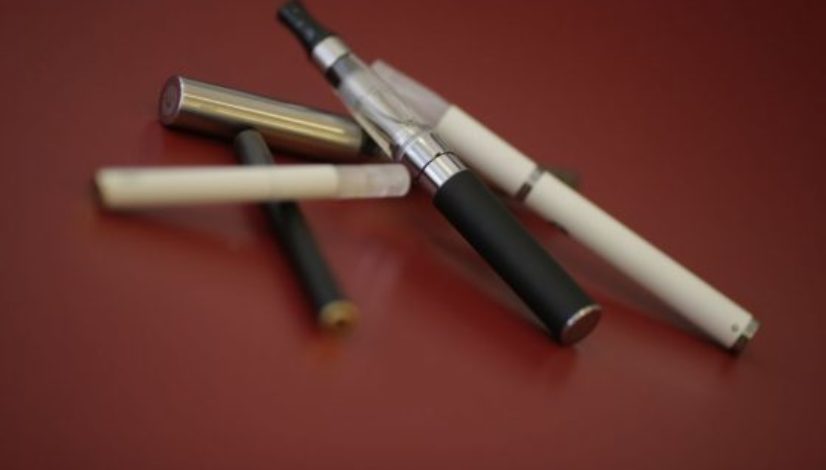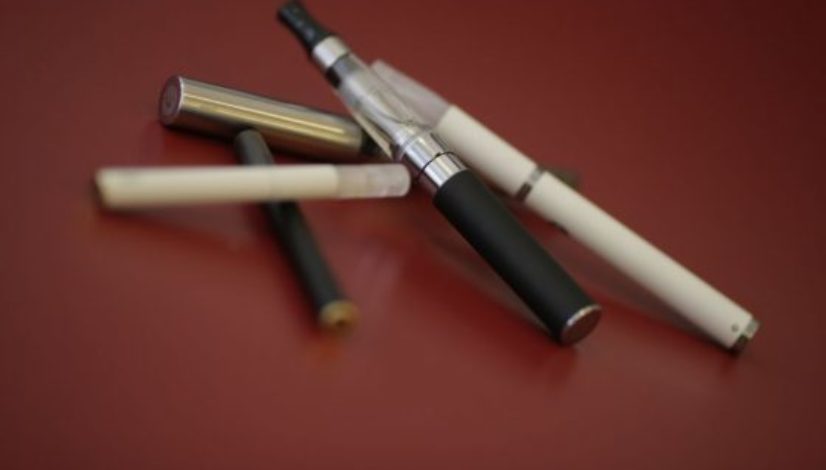More teens sneaking vaping devices into suburban Chicago high schools

Published: Feb 20, 2018, 5:39 pm • Updated: Feb 20, 2018, 5:59 pm
By Vikki Ortiz Healy, Chicago Tribune
Feb. 20–Smoking in the bathroom has returned with a vengeance and a twist at some Chicago-area high schools, where administrators worry that new ways to get a nicotine fix are making the illegal habit even more appealing to students, and harder for teachers to catch.
Educators say they have seen a dramatic increase in the number of students caught vaping on campus in recent months. Teens use devices that range from a JUUL — a slim, rectangular device that looks like a USB flash drive — to e-cigarettes, which resemble highlighter markers or oversized lipsticks.
Illinois law prohibits anyone 17 and younger from buying or possessing tobacco of any kind, and state lawmakers are considering a proposal to raise the age to 21 statewide. In 14 cities across the state, including Chicago, the legal age for purchasing tobacco has been raised to 21.
But that hasn’t stopped local students from sneaking vaping devices into their backpacks, shirt sleeves and lockers.
Related: Is vaping a factor in teen use of marijuana?
“There’s a glory to this,” Bill Walsh, principal at Hinsdale Central High School, said of students smoking e-cigarettes. He said at least 30 vaping devices were confiscated in January, compared with less than a handful each year in previous years. “I don’t think students understand what the long-term effect is.”
Last month, a panel of health experts convened by the National Academies of Sciences, Engineering and Medicine released a report that showed that young people who begin with e-cigarettes are more likely to transition to combustible cigarette use, putting them at higher risk for addiction. The report, which was requested by a division of the FDA, is the most comprehensive analysis of existing research on e-cigarettes.
The American Academy of Pediatrics released a public service announcement last week urging parents to learn the various names for e-cigarettes and what they look like, because e-cigarettes can be especially addictive for developing brains. The announcement comes a year after the academy joined other health organizations in a report urging the FDA to prohibit all candy- and fruit-flavored tobacco products, including e-cigarettes, cigars and hookah tobacco, asserting that these products are undermining national efforts to reduce youth tobacco use and placing children at risk.
Related: Chicago high school considers stiffer anti-vaping discipline, adding vapor detectors to bathrooms
Still, those working to keep kids away from e-cigarettes say several factors still stand in the way of their efforts: E-cigarettes are easily available online and at a growing number of storefronts, many times without measures in place to keep away underage users. They are offered in flavors appealing to children, including chocolate, mango and creme brulee.
And the devices are so new and can be so discreet that many parents don’t realize that their children are carrying them, said advocates, who added that more needs to be done to ensure that e-cigarettes and related products do not end up in the hands of children.
Prompted in part by the rise of vaping among their peers, some students at Stevenson High School approached state Sen. Julie Morrison, D-Deerfield, about sponsoring a bill that would raise the legal age of tobacco and tobacco-related purchases to 21 statewide.
“With vaping, the new e-cigarettes, which have flavors like cotton candy and strawberry, a lot of high school students just don’t equate that with something that causes serious harm,” said Ashleigh Machado, 17, one of the students who approached Morrison about the rise in teen tobacco use.
“I told them I would love to work with them because young people are most directly affected by this law, and by raising the age to 21, it would limit the access and make a dent in the pipeline,” Morrison said.
The bill, which passed by both House and Senate committees, is expected to go before the state legislature for a final vote.
Related stories
- The top 10 cannabis lifestyle trends of 2017
- Pax Era is the vaporizer of the future for concentrates lovers (review)
- Cannabist Show: He’s CEO of Sensi; He promises ‘side-effect free’ cannabis
- Titanium Grasshopper leaps to next level of discretion, packs surprising power (review)
- Dr. Dabber Aurora gives the concentrate curious an entry-level option (review)
The FDA was originally scheduled to review its e-cigarette regulations last year, but its commissioner, Dr. Scott Gottlieb, delayed the review as part of a broad plan to reduce tobacco deaths in the United States.
That delay has allowed more young people to get pulled into the habit, said Vince Willmore, vice president for communications at the Campaign for Tobacco-Free Kids, based in Washington, D.C.
“We’ve made huge progress in reducing youth smoking in our country and we’re very concerned that e-cigarettes and products like JUUL will undermine that progress and re-normalize tobacco use among kids,” Willmore said.
The concerns have met pushback from the e-cigarette industry, which contends that their products offer addicted cigarette smokers a better option by delivering nicotine without having to burn tobacco. Late last month, a group of e-cigarette makers filed a lawsuit against the FDA challenging the existing regulations set in 2016. Those rules require e-cigarettes, cigars, hookahs and pipe tobacco to be subject to the same guidelines as traditional cigarettes.
A JUUL representative said the company aims to end cigarette smoking by offering existing adult smokers an alternative. “JUUL is not intended for anyone else,” said Christine Castro, a spokeswoman for JUUL. “We strongly condemn the use of our product by minors, and it is in fact illegal to sell our product to minors. No minor should be in possession of a JUUL product.”
The report from the National Academies of Sciences, Engineering and Medicine did acknowledge that substituting e-cigarettes for conventional cigarettes reduces users’ exposure to many chemicals and carcinogens, but that their long-term effects are unclear.
To combat the vaping trend, school officials from Naperville to Elmhurst have been training staff and sending newsletters home to parents about the dangers and prevalence of e-cigarettes.
At Naperville Central High School, dean of students Mike Stock said school officials have referred 20 students for disciplinary action for e-cigarette use this year, compared with only one incident each year for the previous three school years.
Campus supervisors have been instructed to make frequent stops in bathrooms, where students congregate to share a JUUL pod or take puffs of their own devices. Unlike cigarettes, which are easy to detect because of the smoke and smell that lingers on clothing, vaping devices leave behind fruit and candy scents and can easily be tucked into a backpack or shirt sleeve, Stock said.
“It’s something that the kids are a little bit more bold with compared to cigarettes,” Stock said. “Sometimes they’re doing it out in the open, waiting for buses.”
Julie, a 17-year-old junior at Naperville North High School, said she was surprised when a friend pulled her into a bathroom stall early in the school year and asked her to try a JUUL. She didn’t know what it was but declined after the friend explained it was an e-cigarette. Since then, Julie said she has routinely seen her peers vaping.
“It’s not my thing, but it’s just very surprising who does it,” said the student, who asked not to give her last name because she didn’t want to incriminate her friends. “There’s not … a stereotype of the kids who do it. It’s become so popular among students that it’s a variety of people.”
Related: Why vaping is the dumbest thing ever
In Elmhurst, York High School parents received an email from administrators in October with a photograph of five varieties of e-cigarettes, and a warning that the “relatively new activity that students are engaging in at school and at home” would lead to disciplinary consequences for students caught using them at school.
“We ask for your support at home by discussing this issue with your child and letting them know it is not something administration, staff or parents support,” the email said.
Walsh, the principal at Hinsdale Central, said some students bring in JUUL devices dipped in tequila or vodka, which is inhaled along with the tobacco. For such dangerous and reckless violations, detention or suspension from school activities does not seem to be enough to stop behaviors, Walsh said.
“It is really, really concerning,” Walsh said. “They’re putting liquid through their lungs and I don’t think students truly understand that.”
Students also often don’t understand that research has shown that nicotine exposure can harm their still-developing brains. Without a concerted effort from educators, parents and public health administrators, the e-cigarette trend will only continue to flourish, said Willmore, of the Campaign for Tobacco-Free Kids.
“We’re concerned that e-cigarettes have moved from being a fad to being an established tobacco product among kids,” he said. “There really needs to be action to prevent that from happening.”
Topics: concentrates vape, discreet vape, hash oil vape, high-tech vape, Illinois, teen use, teens, vape, vape pen




